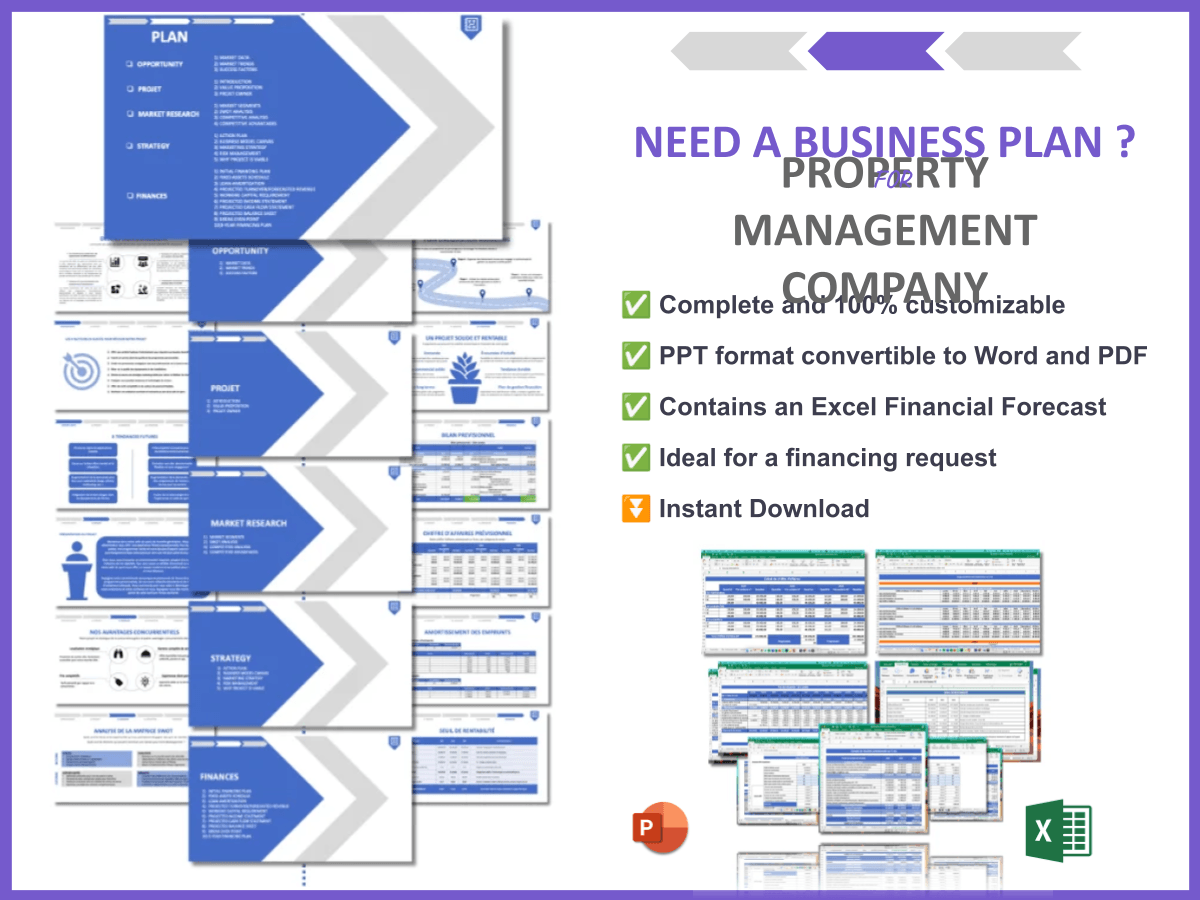Are you thinking about starting a property management company? You’re not alone! The demand for professional property management services has surged, with many investors seeking help to manage their assets effectively. A property management company specializes in overseeing residential, commercial, or industrial properties, ensuring that everything runs smoothly from tenant relations to maintenance. This article will cover:
- Understanding the fundamentals of property management.
- Essential steps to establish your business.
- Market research and competitor analysis.
- Creating a solid business plan.
- Legal considerations and compliance.
- Marketing strategies to attract clients.
1. What is a Property Management Company and Why Start One?
So, what exactly is a property management company? In simple terms, it’s a business that manages real estate properties on behalf of the owners. This includes tasks like finding tenants, handling maintenance issues, and managing finances. The role of a property manager is crucial, especially for those who own multiple properties or live far from their rental units.
Starting a property management company can be a lucrative venture, especially in a growing real estate market. With the increasing number of rental properties and the complexities of managing them, there’s a significant opportunity for entrepreneurs who are willing to step in and offer their services.
Here are some compelling reasons to consider:
- High demand: Many property owners lack the time or expertise to manage their properties effectively.
- Diverse revenue streams: You can offer various services, such as tenant screening, property maintenance, and financial reporting.
- Flexibility: This business can be operated from home or a small office, allowing for a flexible work environment.
2. Develop a Solid Business Idea for Your Property Management Company
The first step in learning how to start a property management company is to refine your business idea. Think about what type of properties you want to manage—residential, commercial, or a mix. This decision will shape your target audience and marketing strategies.
Here are some considerations for developing your business idea:
- Identify your niche: Focus on specific property types, like single-family homes, multi-family units, or commercial spaces.
- Consider additional services: Think about offering complementary services such as maintenance, landscaping, or leasing.
- Research local demand: Look into the rental market in your area to understand what services are in high demand.
It’s also wise to reflect on your personal strengths and experiences. If you have a background in real estate or customer service, leverage that to build a unique selling proposition. For example, if you’ve worked in property maintenance, you might offer superior service in that area, making your company stand out.
Creating a unique value proposition will help differentiate your property management company from competitors. Consider what you can offer that others cannot, whether it’s exceptional customer service, technology integration, or comprehensive property management solutions.
3. Conduct Market Research and Analyze Your Competitors
Next, you need to dive into market research. Understanding your competition is crucial when learning how to start a property management company. What services do they offer? What are their prices? This insight will help you position your property management company effectively.
Start by identifying your local competitors. Look at both established companies and newer entrants in the market. Here’s a simple table to help you organize your findings:
| Competitor | Services Offered | Price Range |
|---|---|---|
| Competitor A | Full-service management | $100 – $200/month |
| Competitor B | Residential management only | $80 – $150/month |
| Competitor C | Commercial and residential | $120 – $250/month |
Once you have this information, analyze it to determine:
- Strengths and weaknesses: What do competitors do well? Where do they fall short?
- Service gaps: Is there a service that isn’t being offered that you can provide?
- Pricing strategies: How do their prices compare to what you plan to charge?
Understanding your competitors will not only help you carve out your niche but also enable you to anticipate market trends and adjust your services accordingly. This proactive approach is vital for the long-term success of your property management company.
4. Choose a Name and Register Your Property Management Company
Your company name is your first impression, so make it memorable and relevant to property management. A good name can convey professionalism and reliability, which are essential in this industry. When choosing a name, consider the following:
- Relevance: Ensure your name reflects the services you offer.
- Memorability: Choose something catchy that clients will remember.
- Availability: Check if the name is available for registration and as a domain for your website.
Once you have a name, the next step is to register it to make your business official. This often involves:
- Checking name availability: Use your state’s business registry to see if your chosen name is already taken.
- Filing necessary paperwork: Depending on your business structure, you may need to file Articles of Incorporation or a Doing Business As (DBA) application.
- Obtaining an Employer Identification Number (EIN): This is necessary for tax purposes and can be obtained through the IRS website.
Having a solid business name and registration will not only help you establish credibility but also make it easier for potential clients to find you. This foundational step is crucial for your property management company to thrive in a competitive market.
5. Create a Comprehensive Business Plan for Your Property Management Company
Writing a business plan is essential for any entrepreneur, especially when figuring out how to start a property management company. A well-crafted business plan serves as your roadmap, outlining your business goals, strategies, and financial projections. It not only helps you clarify your vision but is also crucial for attracting investors or securing loans.
Your business plan should include the following key sections:
- Executive Summary: A brief overview of your business, its mission, and its objectives.
- Market Analysis: Insights into the property management industry, target market, and competitor analysis.
- Marketing and Sales Strategies: How you plan to attract and retain clients.
- Financial Projections: Detailed forecasts of revenue, expenses, and profit margins.
I recommend checking out this business plan template for Property Management Company. It’s super detailed and can save you a ton of time!
Here’s a simple outline for your business plan:
1. Executive Summary 2. Company Description 3. Market Analysis 4. Organization and Management 5. Marketing Strategies 6. Funding Request 7. Financial Projections 8. Appendix
Having a comprehensive business plan will not only help you stay focused but also make it easier to navigate challenges as they arise. It’s a living document that should evolve as your business grows.
6. Decide on the Legal Structure for Your Property Management Company
Choosing the right legal structure is critical for your business when learning how to start a property management company. The structure you choose will affect your taxes, liability, and operational procedures. Here are the most common options:
| Legal Structure | Pros | Cons |
|---|---|---|
| Sole Proprietorship | Easy to set up; full control | Unlimited personal liability |
| Limited Liability Company (LLC) | Limited liability; flexible tax options | More paperwork and fees |
| Corporation | Limited liability; easier to raise capital | Complex structure; double taxation |
Consider your long-term goals and consult with a legal professional or an accountant to determine which structure best fits your needs. Each option has its advantages and disadvantages, so it’s important to choose wisely.
Establishing a solid legal foundation is crucial for the longevity and success of your property management company. It helps protect your assets and ensures compliance with local laws and regulations.
7. Secure Funding and Financial Resources for Your Property Management Company
Getting the necessary funds can be daunting when you’re figuring out how to start a property management company. However, having a solid financial plan is essential to ensure your business can operate smoothly. Here are some options to consider for securing funding:
- Personal Savings: Using your savings can be a straightforward way to fund your startup costs.
- Bank Loans: Traditional loans can provide a lump sum of cash, but be prepared to present your business plan and financial projections.
- Investors: Look for investors who are interested in real estate ventures. They may provide capital in exchange for equity.
When planning your budget, consider the following expenses:
- Startup Costs: Legal fees, office supplies, marketing materials, and software.
- Operating Expenses: Rent, utilities, employee salaries, and insurance.
- Emergency Fund: Always set aside some funds for unexpected expenses or slow months.
Having a clear understanding of your financial needs will help you avoid cash flow issues and set your property management company up for success. Remember, proper financial planning is crucial for long-term sustainability.
8. Obtain Necessary Licenses and Permits for Your Property Management Company
Compliance is key in the property management business. Researching and obtaining the required licenses and permits is essential when learning how to start a property management company. This often varies by state or country, so it’s important to understand your local regulations.
Here are some common licenses and permits you may need:
- Real Estate License: Most states require property managers to hold a real estate license. Check with your local real estate commission for specific requirements.
- Property Management License: Some states have specific licenses for property management businesses.
- Business License: A general business license is often required to operate legally.
To streamline the process, consider the following steps:
- Research Local Laws: Familiarize yourself with the legal requirements in your area.
- Prepare Documentation: Gather all necessary documents, such as identification, proof of business address, and educational credentials.
- Submit Applications: Complete the required applications and pay any associated fees.
Obtaining the right licenses and permits not only helps you stay compliant but also builds trust with clients. A licensed property management company is often viewed as more credible and professional, which can significantly enhance your reputation in the industry.
9. Set Up Financial Management Systems for Your Property Management Company
Managing finances is crucial when learning how to start a property management company. Without a solid financial management system in place, you risk running into cash flow problems, which can severely impact your business. Here are some essential steps to set up an effective financial management system:
- Choose Accounting Software: Invest in reliable accounting software tailored for property management, such as QuickBooks or Buildium. These tools can help you track income, expenses, and generate financial reports.
- Establish a Budget: Create a detailed budget that outlines your expected income and expenses. This will help you manage cash flow and make informed financial decisions.
- Set Up a Separate Business Bank Account: Keeping your personal and business finances separate is vital for accurate accounting and protecting your personal assets.
Here’s a simple checklist for managing your finances:
- Track All Income: Document every rent payment and service fee.
- Record Expenses: Keep receipts and records of all business-related expenses.
- Review Financial Reports Regularly: Analyze your financial statements monthly to identify trends and areas for improvement.
Having a robust financial management system will not only help you stay organized but also provide valuable insights into the health of your property management company. It’s essential for making strategic decisions that drive growth.
10. Establish Your Brand Identity for Your Property Management Company
Branding helps you stand out in a crowded market. Establishing a strong brand identity is essential when figuring out how to start a property management company. Your brand represents your values, mission, and the quality of service you provide. Here are some steps to create a compelling brand identity:
- Define Your Brand Values: Identify what your company stands for, such as reliability, integrity, or exceptional customer service.
- Create a Memorable Logo: Design a professional logo that reflects your brand identity. This will be used on your website, marketing materials, and social media.
- Develop a Consistent Brand Voice: Your communication style should reflect your brand personality. Decide whether you want to be formal, friendly, or somewhere in between.
To visualize your brand identity, consider the following elements:
| Brand Element | Description |
|---|---|
| Logo | A unique design representing your company. |
| Color Palette | Choose colors that evoke the emotions you want to convey. |
| Tagline | A catchy phrase that summarizes your business mission. |
Building a strong brand identity will help you attract clients and establish trust in your property management company. It’s an investment that pays off in customer loyalty and recognition.
11. Develop a Professional Website for Your Property Management Company
In today’s digital world, having a website is non-negotiable when figuring out how to start a property management company. Your website serves as your online storefront and is often the first impression potential clients will have of your business. Here are some essential components to include in your website:
- User-Friendly Design: Ensure that your website is easy to navigate and visually appealing. Use a clean layout and clear calls to action.
- Service Descriptions: Clearly outline the services you offer, such as tenant screening, property maintenance, and lease management.
- Contact Information: Make it easy for potential clients to reach you by prominently displaying your phone number, email, and contact form.
Here’s a simple checklist to ensure your website meets professional standards:
- Mobile Responsiveness: Ensure your site looks good on all devices, including smartphones and tablets.
- SEO Optimization: Use relevant keywords throughout your site to improve search engine visibility, such as property management services and property management company.
- Client Testimonials: Showcase reviews from satisfied clients to build credibility and trust.
A well-designed website will not only attract potential clients but also serve as a valuable resource for existing ones. It’s an essential tool for your property management company to thrive in a competitive market.
12. Market and Advertise Your Property Management Company
Once your business is set up, it’s time to attract clients. Marketing is crucial when learning how to start a property management company. You need a robust strategy to get your name out there and reach potential clients. Here are some effective marketing strategies:
- Social Media Marketing: Use platforms like Facebook, Instagram, and LinkedIn to connect with potential clients and showcase your services.
- Online Advertising: Consider using Google Ads or Facebook Ads to target specific demographics interested in property management services.
- Networking: Attend local real estate events and join property management associations to build connections and gain referrals.
Here’s a breakdown of potential marketing channels:
| Marketing Channel | Description | Cost |
|---|---|---|
| Social Media | Engage with clients and share updates. | Low to Medium |
| Online Ads | Target specific audiences for lead generation. | Medium to High |
| Email Marketing | Send newsletters and offers to clients. | Low |
Implementing a combination of these strategies will help you create a strong presence in the market and attract clients to your property management company. Consistency is key; regularly engage with your audience and adapt your marketing efforts based on what works best.
13. Assemble Your Team for Your Property Management Company
If you’re planning to manage multiple properties, consider building a team. Hiring the right people is essential when learning how to start a property management company. Here are some key roles to consider:
- Property Managers: Responsible for day-to-day operations, tenant relations, and property maintenance.
- Administrative Support: Helps with office tasks, scheduling, and client communication.
- Maintenance Staff: Handles repairs and upkeep of the properties you manage.
To ensure you hire the right team members, consider the following steps:
- Define Roles Clearly: Outline the responsibilities and qualifications needed for each position.
- Conduct Thorough Interviews: Assess candidates not only for their skills but also for their fit with your company culture.
- Provide Training: Equip your team with the necessary knowledge and tools to perform their jobs effectively.
Building a strong team will allow your property management company to operate efficiently and provide exceptional service to your clients. Remember, your employees are your most valuable asset, so invest in their success.
Conclusion
Starting a property management company can be a rewarding and lucrative venture if you follow the right steps. From developing your business idea and conducting thorough market research to establishing a strong brand and marketing your services, each step is crucial for your success. Remember, the key to thriving in this industry is not just about managing properties but also about building relationships and providing exceptional service to your clients.
For further insights, check out our articles on how to create a SWOT Analysis for Property Management Company and learn how to develop a Property Management Company Marketing Plan with practical examples. These resources will equip you with the tools and strategies needed to excel in the property management field.
FAQ
- What is a property management company?
A property management company manages real estate properties on behalf of owners, handling tasks like tenant relations, maintenance, and financial reporting. - How do I start a property management company?
To start a property management company, you should develop a solid business idea, conduct market research, create a business plan, secure funding, and obtain necessary licenses. - What licenses do I need for property management?
Common licenses required include a real estate license, property management license, and a general business license, which vary by state or country. - How do I market my property management services?
Effective marketing strategies include social media marketing, online advertising, and networking within the real estate community. - What should be included in a property management business plan?
A comprehensive business plan should include an executive summary, market analysis, marketing strategies, and financial projections. - What are the typical fees for property management?
Property management fees typically range from 8% to 12% of the monthly rent, depending on the services offered and the property type. - How do I find clients for my property management company?
Networking, referrals, and targeted marketing campaigns can help you attract clients. Building a strong online presence is also crucial. - What services do property management companies offer?
Services often include tenant screening, rent collection, property maintenance, financial reporting, and lease management. - How can I ensure compliance in property management?
Stay informed about local laws and regulations, obtain necessary licenses, and implement proper procedures for tenant relations and property maintenance. - Is it necessary to hire a team for my property management company?
While it’s possible to start on your own, hiring a team can help you manage multiple properties effectively and provide better service to clients.







